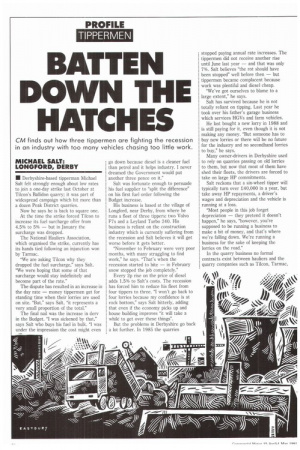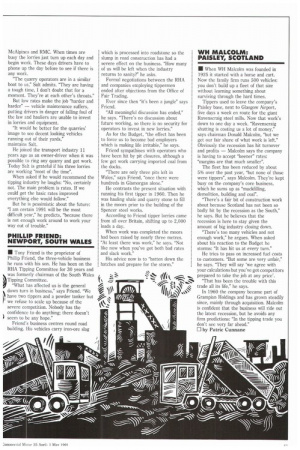BATTEN DOWN TN HATCHES
Page 52

Page 53

If you've noticed an error in this article please click here to report it so we can fix it.
• Derbyshire-based tipperman Michael Salt felt strongly enough about low rates to join a one-day strike last October at Tilcon's Ballidon quarry; it was part of widespread campaign which hit more than a dozen Peak District quarries.
Now he says he is back to square one.
At the time the strike forced Tilcon to increase its fuel surcharge offer from 4.5% to 5% — but in January the surcharge was dropped.
The National Hauliers Association, which organised the strike, currently has its hands tied following an injunction won by Tarmac.
"We are asking Tilcon why they dropped the fuel surcharge," says Salt. "We were hoping that some of that surcharge would stay indefinitely and become part of the rate."
The dispute has resulted in an increase in the day rate — money tippermen get for standing time when their lorries are used on site. "But," says Salt, "it represents a very small proportion of the total."
The final nail was the increase in dery in the Budget. "I was sickened by that," says Salt who buys his fuel in bulk. "I was under the impression the cost might even go down because diesel is a cleaner fuel than petrol and it helps industry. I never dreamed the Government would put another three pence on it."
Salt was fortunate enough to persuade his fuel supplier to "split the difference" on his first fuel order following the Budget increase.
His business is based at the village of Longford, near Derby, from where he runs a fleet of three tippers: two Volvo F7s and a Leyland Turbo 240. His business is reliant on the construction industry which is currently suffering from the recession and Salt believes it will get worse before it gets better.
"November to February were very poor months, with many struggling to find work," he says. "That's when the recession started to bite — in February snow stopped the job completely."
Every 2p rise on the price of diesel adds 1.5% to Salt's costs. The recession has forced him to reduce his fleet from four tippers to three. "I won't go back to four lorries because my confidence is at rock bottom," says Salt bitterly, adding that even if the economy picks up and house building improves "it will take a while to get over these things".
But the problems in Derbyshire go back a lot further. In 1985 the quarries stopped paying annual rate increases. The tippermen did not receive another rise until June last year — and that was only 7%. Salt believes "the rot should have been stopped" well before then — but tippermen became complacent because work was plentiful and diesel cheap.
"We've got ourselves to blame to a large extent," he says.
Salt has survived because he is not totally reliant on tipping. Last year he took over his father's garage business which services HGVs and farm vehicles.
He last bought a new lorry in 1988 and is still paying for it, even though it is not making any money. "But someone has to buy new lorries or there will be no future for the industry and no secondhand lorries to buy," he says.
Many owner-drivers in Derbyshire used to rely on quarries passing on old lorries to them, but now that most of them have shed their fleets, the drivers are forced to take on large HP commitments.
Salt reckons that a six-wheel tipper will typically turn over £40,000 in a year, but take away HP repayments, a driver's wages and depreciation and the vehicle is running at a loss.
"Most people in this job forget depreciation — they pretend it doesn't happen," he says, "however, you're supposed to be running a business to make a bit of money, and that's where we're falling down. We're running a business for the sake of keeping the lorries on the road."
In the quarry business no formal contracts exist between hauliers and the quarry companies such as Tilcon, Tarmac, McAlpines and RMC. When times are busy the lorries just turn up each day and begin work. These days drivers have to phone up the day before to see if there is any work.
"The quarry operators are in a similar boat to us," Salt admits. "They are having a tough time, I don't doubt that for a moment. They're at each other's throats."
But low rates make the job "harder and harder" — vehicle maintenance suffers, putting drivers in danger of falling foul of the law and hauliers are unable to invest in lorries and equipment.
"It would be better for the quarries' image to see decent looking vehicles running out of their yards," maintains Salt.
He joined the transport industry 11 years ago as an owner-driver when it was possible to ring any quarry and get work. Today Salt is grateful if his three lorries are working "most of the time".
When asked if he would recommend the tipping industry he laughs: "No, certainly not. The main problem is rates. If we could get the basic rates improved everything else would follow."
But he is pessimistic about the future: "I am certain 1991 will be the most difficult year," he predicts, "because there is not enough work around to work your way out of trouble."
• Tony Friend is the proprietor of Phillip Friend, the three-vehicle business he runs with his son. He has been on the RHA Tipping Committee for 30 years and was formerly chairman of the South Wales ) Tipping Committee.
'What has affected us is the general
rk down turn in business," says Friend. "We have two tippers and a powder tanker but I we refuse to scale up because of the severe competition. Nobody has the , confidence to do anything; there doesn't 0 seem to be any hope."
Friend's business centres round road building. His vehicles carry iron-ore slag
which is processed into roadstone so the slump in road construction has had a severe effect on the business. "How many of us will be left when the industry returns to sanity?" he asks.
Formal negotiations between the RHA and companies employing tippermen ended after objections from the Office of Fair Trading.
Ever since then "it's been a jungle" says Friend.
"All meaningful discussion has ended," he says. "There's no discussion about future working, so there is no security for operators to invest in new lorries."
As for the Budget, "the effect has been to force us to become bad employers which is making life irritable," he says.
Friend sympathises with operators who have been hit by pit closures, although a few get work carrying imported coal from the docks.
"There are only three pits left in Wales," says Friend, "once there were hundreds in Glamorgan alone."
He contrasts the present situation with running his first tipper in 1960. Then he was hauling shale and quarry stone to fill in the moors prior to the building of the Spencer steel works.
According to Friend tipper lorries came from all over Britain, shifting up to 2,000 loads a day, When work was completed the moors had been raised by nearly three metres. "At least there was work," he says. "Not like now when you've got both bad rates and slack work."
His advice now is to "batten down the hatches and prepare for the storm."
























































































































